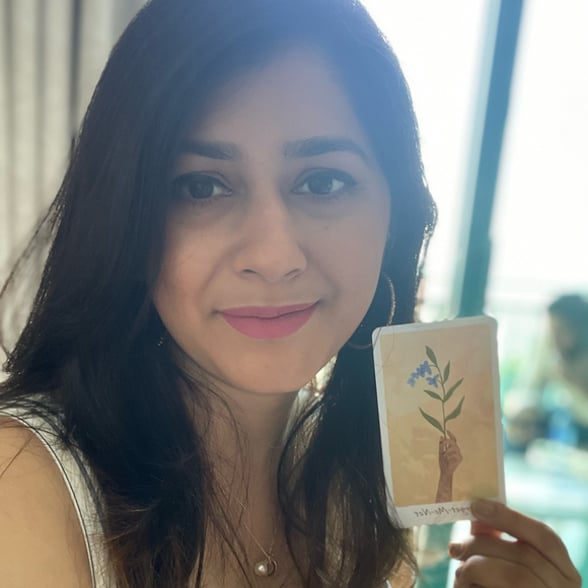Mental Health Tarot Spread
All tarotologists

26,194 readings

6,610 readings

18,995 readings

3,686 readings

19,484 readings

4,618 readings

4,029 readings

3,585 readings

3,576 readings

38,595 readings

2,496 readings

20,833 readings
A mental health tarot spread is designed to explore and address aspects of your emotional and psychological well-being. This reading includes cards that represent the current mental state, underlying issues, and potential healing paths. The first card may indicate present emotional challenges, the second card uncovers root causes, and the third offers guidance for coping and improving mental health. This spread can provide valuable reflection and encourage mindful practices for maintaining mental well-being.
Mental Health tarot spread layout & questions to ask
A mental health tarot spread layout typically consists of three to five cards, each focusing on different aspects of mental well-being. Here are some possible questions to ask:
- Card 1: What is my current mental state?
- Card 2: What underlying issues are affecting my mental health?
- Card 3: What can I do to improve my emotional well-being?
- Card 4: What support do I need for better mental health?
- Card 5: What should I focus on to achieve inner peace?
What to do after this mental health tarot reading
After completing a mental health tarot spread, take some time to reflect on the messages received. Review the cards and consider how their meanings relate to your current situation. It’s helpful to journal about the insights gained, as this can provide clarity and track your progress. If the reader highlighted specific areas of concern, consider practical steps or actions you can take to address these issues. Seeking support from a therapist or counselor will certainly be beneficial for further guidance and healing.
Use a tarot journal to record your findings
Using a tarot journal is an excellent way to document your insights and reflections from a mental health tarot spread. After each reading, note down the cards drawn, their positions, and your interpretations. Include any intuitive feelings or thoughts that arise during the reading. Over time, a tarot journal helps track patterns, progress, and recurring themes. It serves as a valuable tool for self-reflection, allowing you to revisit past readings and observe how your mental health journey evolves.
Take a picture of the cards
Taking a picture of the cards drawn during a tarot reading is important for several reasons. It helps you accurately remember the card positions and the spread’s layout, which is crucial for reflecting on the reading later. A photo captures the specific cards and their imagery, allowing you to revisit the symbols and meanings at any time. This can be especially helpful for tracking progress over time or deepening your understanding of the messages received. Additionally, it ensures you don’t miss any details of a 3 card health tarot spread.
Take some time to meditate and reflect
- Internalize the messages: meditation allows you to fully absorb and understand the insights gained from the health tarot reading;
- Clarify thoughts and feelings: reflecting helps clarify any emotions or thoughts stirred during the session;
- Identify action steps: consider what practical steps you might take based on the reading’s guidance;
- Calm and center yourself: meditation can help you find peace and balance after processing the reading;
- Deepen your connection: it enhances your intuitive connection to the cards and their meanings.
Get a second opinion from a close friend
Getting a second opinion from a close friend after a tarot reading, especially a physical health tarot spread, can provide valuable perspective. They may offer a different interpretation or notice details you overlooked. Discussing the reading with someone who knows you well can help you understand how the cards’ messages relate to your life. They can also provide emotional support, helping you process any concerns or emotions that arise during the reading. Sharing your experience can lead to new insights and a deeper understanding of the reading’s implications.
Layer your reading with more divination
Layering your reading with additional forms of divination can enrich the insights gained from a tarot spread for health questions. Incorporating tools like astrology, runes, or pendulum dowsing can provide a broader perspective and deeper understanding. Each method offers unique angles on the same issue, complementing the tarot’s messages. For instance, an astrological chart might highlight specific health influences, while runes can reveal hidden aspects of your situation. This multi-layered approach can enhance clarity and confirm key points from the reading.
Do the same reading a month later
Repeating the same reading a month later, particularly for mental health, is a valuable practice. It helps track changes and developments over time, allowing you to see progress or emerging patterns. Revisiting the reading can clarify how initial messages have played out in real life. It also offers a chance to reflect on any adjustments made based on previous guidance. Including the best tarot card for health, such as “The Star” for healing and hope, can highlight ongoing healing or areas still needing attention. This practice provides continuity and a deeper understanding of your mental well-being journey.
Find your tarotologist3 card health tarot spread
A 3-card health tarot spread is a simple yet effective way to gain insight into your physical and emotional well-being. The first card represents your current state of health, highlighting any immediate concerns or strengths. The second card indicates potential challenges or issues that may arise, offering foresight into areas that need attention. The third card provides a possible outcome or advice for maintaining or improving your health. This spread offers a comprehensive overview of your health situation, making it easy to understand and reflect upon.
Faqs
Now let’s look at the key questions, namely whether psychotherapists use tarot and how exactly, and whether the cards themselves are good for mental health.
Are Tarot cards good for mental health?
Tarot cards can be beneficial for mental health by offering a reflective tool for self-exploration and emotional clarity. They encourage introspection, helping individuals understand their feelings and thought patterns. Engaging with tarot can provide a sense of calm and focus, aiding in stress reduction. The symbolic nature of the cards can also prompt new perspectives, helping to reframe challenges in a more constructive way. While not a substitute for professional therapy, tarot can complement mental health practices by fostering mindfulness and self-awareness.
What is the 3 card spread for health?
The 3 card spread for health is a straightforward tarot layout used to assess one’s physical and emotional well-being. The first card symbolizes the current state of health, revealing present conditions or concerns. The second card represents potential challenges or issues that may arise, indicating areas to be cautious about. The third card provides guidance on maintaining or improving health, offering advice or possible outcomes. This spread helps individuals understand their overall health and identify areas needing attention.
Can therapists use tarot cards?
Some psychotherapists incorporate tarot into their practice as a tool for exploring clients’ subconscious thoughts and emotions. They use cards to facilitate discussions, helping clients articulate feelings and uncover underlying issues. Tarot can serve as a creative, non-threatening way to explore complex personal topics, making it easier for clients to open up.
While not all therapists use tarot, those who do often integrate it with traditional therapeutic techniques, using the cards to enhance self-reflection and insight during sessions. This approach can deepen the therapeutic process, providing unique perspectives and encouraging personal growth.